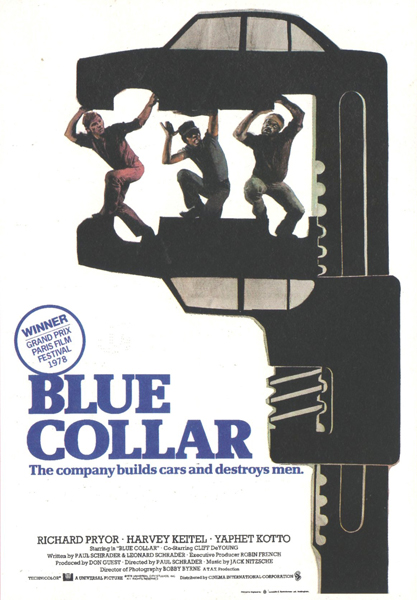 I don’t know how many of you are familiar with Paul Schrader. He is sort of a lesser known legend of independent film. Legendary because of the many screenplays he wrote for Martin Scorsese, including Taxi Driver, lesser because he went on to direct crap like the rock band movie Light of Day with Michael J. whatsisdick. And that sort of thing tends to lower people’s opinion of you. I mean, you don’t see the dude who did Satisfaction with Justine Bateman going on to inspire a new generation of filmmakers. That’s just the way it works.
I don’t know how many of you are familiar with Paul Schrader. He is sort of a lesser known legend of independent film. Legendary because of the many screenplays he wrote for Martin Scorsese, including Taxi Driver, lesser because he went on to direct crap like the rock band movie Light of Day with Michael J. whatsisdick. And that sort of thing tends to lower people’s opinion of you. I mean, you don’t see the dude who did Satisfaction with Justine Bateman going on to inspire a new generation of filmmakers. That’s just the way it works.
But Paul Schrader did make sort of a comeback. After a really terrible Elmore Leonard/Tom Arnold picture called Touch he did Affliction with James Coburn and got some Oscars and what not. Now I am in favor of any picture that gets an Oscar for James Coburn just on basic principle, but I haven’t seen it yet so instead I will review Mr. Schrader’s first work as a director, and still maybe his best, Blue Collar.
 You see this picture is important to me because it is one of Richard Pryor’s few great film roles outside of his stand up films. Richard was in many shoddy films made by people with no understanding of his talents or desire to display them properly. So you get the man dressed up as a chicken or running around getting his ass bit by piranhas or what not. The kind of garbage that Robin Williams could even do. And as Richard once confessed to me, by writing his autobiography, he was too far gone in his addiction to really care any more. He just wanted “the moneys” and so would sign on to pictures like Super Man Part 3 that he thought were crap.
You see this picture is important to me because it is one of Richard Pryor’s few great film roles outside of his stand up films. Richard was in many shoddy films made by people with no understanding of his talents or desire to display them properly. So you get the man dressed up as a chicken or running around getting his ass bit by piranhas or what not. The kind of garbage that Robin Williams could even do. And as Richard once confessed to me, by writing his autobiography, he was too far gone in his addiction to really care any more. He just wanted “the moneys” and so would sign on to pictures like Super Man Part 3 that he thought were crap.
So Blue Collar is one of the few pictures where he actually got to play a multi-faceted, dramatic type role where he gets to be funny but also gets to display other emotions convincingly and organically within the story. He gets to change throughout the movie, but not in the, “It turns out I have a big heart after all and love kids” type of way. I mean it’s the other way around, he turns into kind of a villain, he sells the fuck out.
Richard is not the main star of the picture, though, he shares the spotlight with Harvey Keitel and Yaphet Kotto. So you see it is a great cast. It turns out that behind the scenes all three were told that they would be the main star, were incredibly jealous of each other and could rarely film a scene together without getting into a fist fight or storming off the set. But in the film they are convincing as friends at an auto factory who attempt to rob their own corrupt union.
This is one of those type of pictures that could only really be made in the ’70s or in the ’80s with Roddy Piper, where it is a political film within a genre film. Today, a political film is usually about one specific topic – tobacco, or a gay guy for one example. Then it could be about a fabric of people or a general feeling or what not. It is about the feeling these people have that they are working harder and getting less every day. It is about trying to get enough money to feed your family and pay your taxes when it’s just not possible. It is about not being able to afford braces for your daughter and she ends up trying to make her own by jamming wires in her mouth. Jesus, that’s some fucked up shit.
At the same time it is not really as preachy as I expected. It just feels natural for these characters because it’s a fact of life you can’t really deny, and it drives the plot. To be frankly honest I used to think Paul Schrader was kind of a jackass. I thought maybe Scorsese had been the dude that made Taxi Driver work and that Schrader had been coasting off him ever since. Schrader seemed really pretentious to me with his obsessions with religious symbolism and the plight of the working class. And he definitely gets obsessed with some of these things, because Light of Day has some of the same plot elements as Blue Collar – Michael J. just can’t pay the rent being a working class Detroit rock musician so he breaks into somebody’s house and steals tools.
But Schrader has a commentary track on the Blue Collar dvd and it made me respect the guy. Turns out he is pickier about this crap than I am, and he winces and gets embarrassed every time the politics comes up. He starts laughing when there is a crucifix on the wall, and says how he tried to talk Scorsese out of having Catholic symbolism in Bringing Out the Dead. “This was okay when we were 22, but now we’re 52.” He seems skeptical about his success as a director on this film, but I think he is being modest. Even if he spent more time breaking up fist fights than setting up cameras, he somehow got great improvisational performances out of these guys. And unlike that cheesy rock n roll film, I like the use of rock/blues music on Blue Collar. Which is saying alot because I am not a fan of the “Bad to the Bone” type of music. But in the opening credits here there is one of the best combinations of music and editing I’ve seen in a while, as both the music and freeze frames reflect the machinery of the assembly line where these dudes work.
Anyway, it’s good. I am happy to point some of you to some of the lesser known works you haven’t heard of. So especially if you want to see Richard Pryor shine as an actor then get thee to a video store motherfucker thanks.


























July 5th, 2010 at 9:44 am
A good review Vern; speaking of political thrillers (inevitably involving tobacco), did you ever get around to watching/reviewing THE INSIDER? I know you have your misgivings about Michael Mann, but I think this is definitely one of his better ones.
And for a movie with Al Pacino and Russell Crowe, it’s nice that the big grandstanding, shouting-someone-down scene comes from Bruce EXIT WOUNDS McGill.